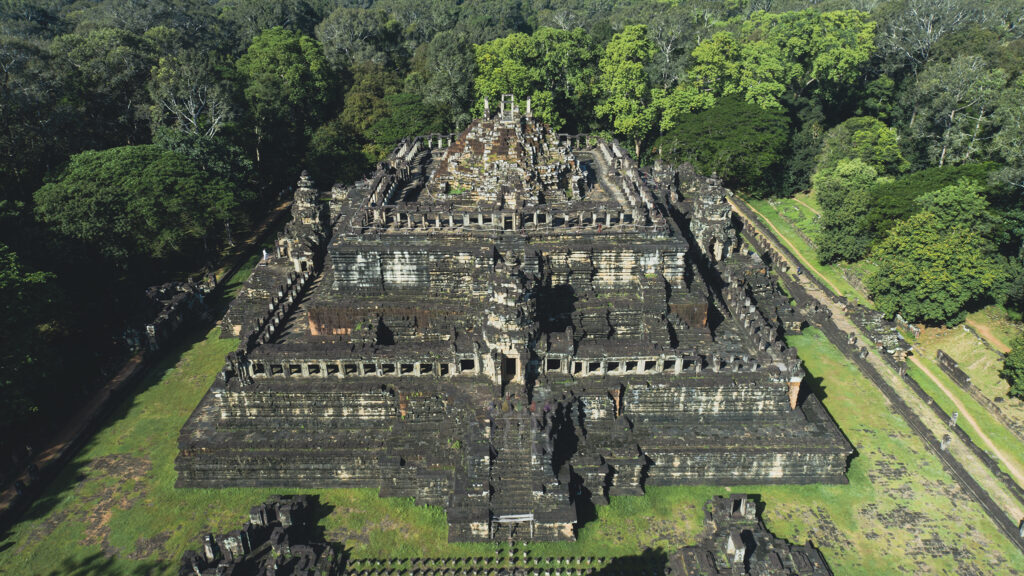ប្រាសាទបាភួន គឺជាប្រាសាទភ្នំតំណាងឱ្យភ្នំសុមេរុ ដែលជាទេវស្ថានរបស់ព្រះឥសូរ។ ប្រាសាទនេះមានឈ្មោះដើមហៅថា “ត្រីភូវនចូនាមណី” ដែលក្រោយមកឈ្មោះនេះនៅសល់តែពាក្យភូវុនក្លាយជាភុន ឬភួនវិញ ពាក្យភុវនមានន័យថា” អ្នកដែលគ្រប់គ្រងលើភពទាំងបី”។ នៅចំពីមុខតួរបស់ប្រាសាទបែរទៅទិសខាងកើត មានស្ពានដើរចូលប្រវែង ២០០ម៉ែត្រ x ២.៥០ម៉ែត្រ ទ្រដោយសសរមូលចំនួន ៥៤៧ដើម រៀបយ៉ាងស្មើស្ពាននេះកសាងឡើងដើម្បីជាតំណាងឱ្យផ្លូវភ្ជាប់ពីឋានមនុស្សទៅឋានសួគ៌។ នៅខាងឆ្វេងដៃស្ពាន មានស្រះមួយមានទំហំ ៣៧ម៉ែត្រx២៨ម៉ែត្រ លម្អដោយកាំជណ្តើរធ្វើអំពីថ្មភក់។
ប្រាសាទនេះជាពីរ៉ាមីតដ៏ធំមួយកំពស់៣៥ម៉ែត្រ ដែលចែកចេញបីថ្នាក់ ហើយដែលព្រះបាទឧទយាទិត្យវរ្ម័នទី២សាងឡើងនៅស.វ.ទី១១ ដើម្បីតម្កល់លិង្គមួយនៅជាន់លើបង្អស់។ អ្នកជំនាញធំៗដែលធ្លាប់បានស្រោចស្រង់ប្រាសាទនេះក្នុងលក្ខណៈជាសង្គ្រោះបន្ទាន់ក្តី ឬជួសជុលក្នុងបំណងឲ្យបានយូរអង្វែងនៅតាមទីដែលរលំខ្លះក្តី សុទ្ធសឹងយល់ស្របគ្នាថាវិស្វកម្មដែលប្រើក្នុងការកសាងប្រាសាទជាលើកដំបូងមានខ្ចោះដោយសារគិតមិនដល់តាំងពីដើមទី។ ក្នុងប្រវត្តិនៃការជួសជុលបុរាណស្ថានអង្គរទាំងអម្បាលម៉ាន គឺប្រាសាទបាភួននេះហើយដែលទទួលការជួសជុលច្រើនលើកហើយធំធេងវែងឆ្ងាយជាងគេ។ បើរាប់តែកម្មវិធីជួសជុលចុងក្រោយបង្អស់គឺចាប់ផ្តើមនៅទសវត្ស១៩៦០អស់ច្រើនឆ្នាំហើយផ្អាកមួយរយៈវែង ទើបចាប់ផ្តើមបន្តមកទៀតនៅឆ្នាំ១៩៩៥អស់រយៈពេលប្រមាណ១៤ឆ្នាំទៀត។
ចម្លាក់រូបទាំងអម្បាលម៉ានជាទីត្រកាលភ្នែកពន់ពេក។ បើកុំនិយាយពីហោជាងនិងផ្តែរនានា ចម្លាក់ជាក្បាច់ក្រឡោតតែងតែបង្ហាញក្នុងស៊ុមដាច់ចេញពីគ្នាដោយមានរឿងខុសៗគ្នា។ ជួនកាលរូបនោះរំលេចឈុតណាមួយនៃទេពកថាដែលយើងស្គាល់ ខ្លះទៀតបង្ហាញពីទិដ្ឋភាពផ្សេងៗនៃការរស់នៅរាល់ថ្ងៃនៃប្រជាជនសាមញ្ញ។ ប៉ុន្តែជាញឹកញយដែរ គេប្រទះឃើញរូបប្លែកៗដែលលំបាកនឹងបកស្រាយថាអ្នកឆ្លាក់ចង់បង្ហាញពីអ្វី។
ការឧទ្ទិសទៅព្រះឥសូរដែលជាន័យដើមនៃប្រាសាទនេះ គេបោះបង់ចោលជាស្ថាពរនៅស.វ.ទី១៦ ដើម្បីងាកទៅរកព្រះពុទ្ធសាសនាពេញទី។ នៅជំនាន់នោះគេរៀបចំឡើងវិញនូវថ្មជាច្រើនរាប់មិនអស់ដែលរលំធ្លាក់មកពីជាន់ទី២ នៅផ្នែកខាងលិច ឲ្យទៅជារូបព្រះពុទ្ធអង្គចូលនិព្វានប្រវែងជាង៦០ម៉ែត្រ។ នៅសម័យនោះហើយដែលប្រាសាទបាភួនថ្កុំថ្កើងឡើងវិញមួយរយៈពេលជាថ្មីទៀត។ ការកែប្រែស្ថាបត្យកម្មដើមមកឲ្យបម្រើសាសនាថ្មីក្នុងកម្រិតធំធេងបែបនេះ មានតែនៅភ្នំបាខែងដែលនៅខាងត្បូងបរិវេណអង្គរធំនេះទេដែលអាចប្រៀបគ្នាបាន៕
អត្ថបទ÷ នាយកដ្ឋាន ស្រាវជ្រាវ បណ្ដុះបណ្ដាល និងផ្សព្វផ្សាយ
រូបភាព÷ ជា វណ្ណៈ
Baphuon is a mountain temple representing Mount Meru, the temple of Shiva. The temple was originally called “Tri Phuon Jonamani”, after which the name Phu Wun became Phuon, the word Phuon means “the ruler of the three worlds”. In front of the temple facing east is a 200-meter x 2.50-meter walkway with 547 round pillars arranged evenly. This bridge was built to represent the road from the land of the living to heaven. To the left of the bridge is a pond measuring 37m x 28m, adorned with sandstone staircases.
The temple is a large pyramid, 35 m high, divided into three tiers, which King Udayadityavarman II built in the 11th century to hold a Linga on the top floor. The great experts who once restored the temple in an emergency or repaired it for a long time in some parts have all agreed that the engineering used to build the temple for the first time was flawed from the beginning. In the history of the restoration of Angkor archeological sites, this Baphuon temple has been repaired many times. The last major renovation was in the 1960s, after which it was suspended for several years and then resumed in 1995 for another 14 years.
Not to mention the pediments and lintels, the embossed sculptures are always presented in separate frames with different stories. Sometimes it depicts a scene from a fairy tale that we know, while others depict different aspects of the daily lives of ordinary people. But often they find strange images that are difficult to interpret what the sculptor wants to convey.
Dedication to Shiva, the original meaning of the temple, was abandoned in the 16th century to convert to full-fledged Buddhism. At that time, countless stones were reclaimed from the second floor on the west side into a 60-meter-long Nirvana Buddha statue. It was at that time that Baphuon Temple was rebuilt for a while. The transformation of the original architecture to serve the new religion on such a large scale is only possible at Phnom Bakheng Temple, south of Angkor Thom.
Article: Department of Research, Training and Communication
Photos: Chea Vannak
Share:
Our Latest News

អាជ្ញាធរជាតិអប្សរា រៀបចំកម្មវិធីបណ្ដុះគំនិតកុមារចេះថែរក្សាបរិស្ថានក្នុងតំបន់អង្គរ- APSARA National Authority organizes an environmental training program for children in the Angkor site- 29 May 2025
ថ្ងៃទី២៩ ខែឧសភា ឆ្នាំ២០២៥ អង្គភាពប្រព័ន្ធគ្រប់គ្រងបរិស្ថានអង្គរនៃអាជ្ញាធរជាតិអប្សរា សហការជាមួយសាលាបឋមសិក្សាចំនួន៣ មានសាលាបឋមសិក្សាដូនឪ សាលាបឋមសិក្សាត្រពាំងស្វាយ សាលាបឋមសិក្សាគោកគ្រើល ស្ថិតក្នុងស្រុកអង្គរធំ ខេត្តសៀមរាប




